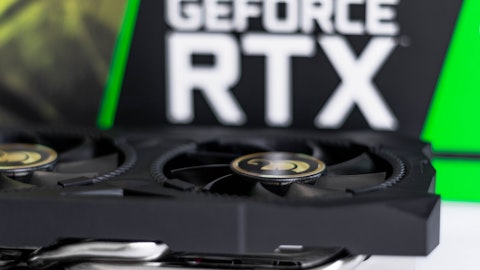We recently compiled a list of the 10 Best Beginner Stocks To Buy Now. In this article, we are going to take a look at where NVIDIA Corporation (NASDAQ:NVDA) stands against the other beginner stocks.
While investing in the stock market carries risk, the US stock market is generally considered a safe place to invest. It has a long history of growth and has consistently recovered from downturns, including major recessions and financial crises.
Over the last four to five years, the market has been hit by several unexpected downturns, due to a global pandemic and the Russia-Ukraine war, among other things, that crippled the global economy. However, the US broader market recovered swiftly and has been performing well since 2023. It is nearly 19% up year-to-date, as of August 23.
Nevertheless, it is still a complicated place for beginners and they should consider investing in shares of well-established companies with a history of stable performance and reliability. These stocks typically belong to large, financially sound companies that operate in diverse industries, such as technology, consumer goods, and healthcare.
Additionally, beginners can also look into index funds or exchange-traded funds (ETFs) that track major market indices like the S&P 500. These options offer diversification, which reduces the risk associated with investing in individual stocks while still providing exposure to the broader market’s potential gains. Investing in such well-established and diversified assets can help beginners build confidence and knowledge in the stock market. For such ETFs, you can check out our article on the best large-cap growth ETFs.
Opportunities and Caution for New Investors Due to Consumer Behaviour
On August 16, Melissa Minkow, director of retail strategy at CI&T, discussed the latest trends in U.S. consumer spending in a CNBC interview. Despite concerns about a potential recession, Minkow believes we might have avoided one. She pointed out that although consumers may feel like they are in a recession, their spending habits show otherwise. They continue to spend, especially when presented with discounts. Retailers have adapted by offering more targeted promotions this year, which has helped maintain consumer spending despite previous challenges like the pandemic and supply chain issues.
Minkow also noted that the effectiveness of promotions can vary across sectors. For example, quick-service restaurants like McDonald’s and Starbucks haven’t seen the same benefits from discounts as other retailers, partly because consumers may opt for more cost-effective alternatives like home-cooked meals. Additionally, brands that are already positioned as discount options might not see as much impact from promotions. However, retailers who offer significant discounts on desirable items can attract cost-conscious shoppers and increase sales volume, potentially offsetting the impact on profit margins.
For beginner investors in the stock market, the current retail sector dynamics offer both opportunities and challenges. The resilience of consumer spending, even in the face of economic uncertainty, suggests that certain sectors and companies could continue to perform well, especially those that effectively use promotions to drive sales. Retailers offering targeted discounts on popular items may attract more customers, boosting their sales volumes, which could lead to positive stock performance.
However, beginner investors should also be cautious. Not all companies benefit equally from promotions, as seen with the restaurant and food segment, where discounts haven’t significantly improved earnings. This highlights the importance of understanding the specific business models and market positioning of companies before investing.
The Market is Healthy but Caution is Advised
The U.S. stocks have seen a significant surge over the last few quarters, which are mainly driven by strong economic data and optimism about a potential soft landing for the U.S. economy. However, experts remain cautious as we discussed in our best defensive stocks article.
In the article, we discussed the J.P. Morgan report that noted the market’s heavy reliance on large, high-quality tech and AI companies, and it warned that maintaining this momentum could be challenging due to high valuations and potential market volatility. Here is an excerpt from the article:
“According to a July report by J.P Morgan, recent market trends have benefited large, high-quality companies, especially in tech and AI, which have resulted in high market concentration. However, maintaining this momentum in the second half of 2024 could be difficult due to high valuations and investor positioning. The report says that while U.S. market volatility is currently low, it could rise if conditions change.
According to Bruce Kasman, global growth is steady at 2.4%, with improved recoveries in Western Europe and emerging markets, along with a rebound in the manufacturing sector. Despite this, core global inflation is projected to remain around 3% in 2024, which could limit the potential for policy easing. Kasman warned that achieving inflation control and rate normalization might weaken demand and could interact with political factors to cause further inflation and central bank tightening.”
Our Methodology
For this article, we used stock screeners to identify large to mega-cap stocks with a revenue compound annual growth rate of at least 5% over the last 10 years. The companies we chose are well-known, well-established, fundamentally strong, and some also pay regular dividends. We listed the companies in ascending order of their hedge fund sentiment as of the second quarter of 2024.
Why are we interested in the stocks that hedge funds pile into? The reason is simple: our research has shown that we can outperform the market by imitating the top stock picks of the best hedge funds. Our quarterly newsletter’s strategy selects 14 small-cap and large-cap stocks every quarter and has returned 275% since May 2014, beating its benchmark by 150 percentage points (see more details here).

A close-up of a colorful high-end graphics card being plugged in to a gaming computer.
NVIDIA Corporation (NASDAQ:NVDA)
Number of Hedge Fund Holders: 179
10-year Revenue CAGR: 34%
NVIDIA Corporation (NASDAQ:NVDA) is a tale of innovation, resilience, and strategic evolution which is why it is one of the best beginner stocks to buy. Founded in 1993 by Jensen Huang, Chris Malachowsky, and Curtis Priem in a meeting at Denny’s diner in San Jose, the company started with a vision to revolutionize computing through graphics-based processing. Despite early struggles, including the failure of its first graphics accelerator and a near brush with bankruptcy, the company persevered. As of 2024, it is the most dominant player in the GPU market.
The company’s strategic decisions to diversify into areas like AI, data centers, and autonomous vehicles have paid off immensely. Nvidia’s CUDA software platform, introduced in the mid-2000s, played a pivotal role in establishing the company as a leader in high-performance computing and AI.
Despite some setbacks, NVIDIA’s (NASDAQ:NVDA) growth trajectory has been remarkable, especially after the Gen AI trend that started with the launch of ChatGPT. The company reached a valuation of over $3 trillion in 2024 and briefly became the most valuable publicly traded company.
On August 22, The Fly reported that Citi maintained a Buy rating on NVIDIA (NASDAQ:NVDA) with a price target of $150 in anticipation of the company’s earnings report for the July quarter, scheduled for August 28. Citi analysts believe that the company could exceed Wall Street’s revenue projections by about $1 billion, though this would be less than the $2 billion revenue beat it achieved in the previous four quarters. This lower-than-expected beat is attributed to concerns about supply chain issues and delays related to the company’s Blackwell chip series.
Citi expects that after the earnings report, analysts will likely revise their revenue forecasts upward for NVIDIA’s (NASDAQ:NVDA) upcoming quarters. The firm also anticipates that the company will address Blackwell-related concerns, providing a positive outlook for 2025. This reassurance is expected to boost investor confidence and potentially push the company’s stock to reach a new 52-week high.
As of the second quarter, 179 hedge funds held NVIDIA (NASDAQ:NVDA) shares worth $53.67 billion. Fisher Asset Management is the company’s most significant shareholder with 93.437 million shares worth $11.54 billion, as of June 30.
Aoris International Fund stated the following regarding NVIDIA Corporation (NASDAQ:NVDA) in its Q2 2024 investor letter:
“If Information Technology was the dominant sector for the quarter, NVIDIA Corporation (NASDAQ:NVDA), which is the largest supplier of microprocessors used for generative AI applications, was the dominant company. NVIDIA’s share price rose by a third in the quarter and has increased by 255% so far this year. Since the beginning of 2023, its market value has risen by 8.3x, or $4.3 trillion, making NVIDIA the third largest company in the world by this measure.
As a result of the unusually strong stock price performance from NVIDIA and a few other large companies, equity markets have become increasingly concentrated. You can see this in the chart below, which shows that on 30 June, 27% of the market value of the 500 largest US companies was attributable to just five companies, more than twice the average of the last 20 years.
The composition of the Aoris International Fund will always be very different to that of the broader equity market. There will be periods, such as the most recent quarter, where this contributes to our performance lagging that of our benchmark. When it comes to NVIDIA and other AI-centric companies, rapid growth is exciting, but it makes it difficult for us to judge what is normal. Our preference is to own established leading companies where we can make a more confident, evidence-based judgement about their growth and profitability.”
Overall NVDA ranks 6th on our list of the best beginner stocks to buy. While we acknowledge the potential of NVDA as an investment, our conviction lies in the belief that AI stocks hold greater promise for delivering higher returns and doing so within a shorter timeframe. If you are looking for an AI stock that is more promising than NVDA but that trades at less than 5 times its earnings, check out our report about the cheapest AI stock.
Read Next: $30 Trillion Opportunity: 15 Best Humanoid Robot Stocks to Buy According to Morgan Stanley and Jim Cramer Says NVIDIA ‘Has Become A Wasteland’.
Disclosure: None. This article is originally published at Insider Monkey.





